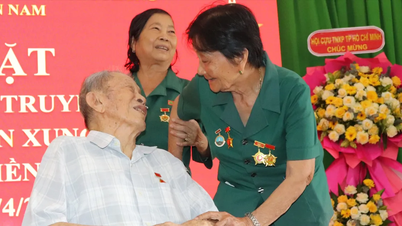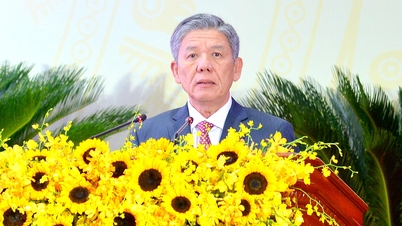I have lived away from my homeland for more than 30 years; every autumn, sitting and watching the raindrops falling, the image of my father appears in my memory from the time I was eight or ten until now, when I am over fifty years old.
My father's youth was full of misfortune. Because he was the youngest child in a family of 10 siblings, when he was eight years old, his grandfather passed away. He only went to school to learn how to read and write, then stayed home to work and live with his two older siblings because my grandmother also returned to live with my grandparents when he was 14 years old. The image of my father in my childhood was that of being energetic with the hard work of plowing and harvesting in the fields; agile on the soccer field and especially, he had a gifted, sweet singing voice that was easily engraved in the memories of girls of the same generation. Therefore, although the family was poor, his parents died early and he had to earn a living with his older brothers and sisters, he was loved and admired by many people, so when he was only nineteen years old, he met my mother and became husband and wife. In the sixties of the last century, my parents had a love affair, unlike the young men and women of the same generation who had to rely on matchmaking to be able to live together. The result of our parents' love was that our 10 siblings were born one after another. The burden of food, clothing, money, books, and education made my parents forget all the joy and youth of their own. With his industrious, hard-working nature and the demands of life, my father could do almost anything. When my brothers and I were young, my father plowed and herded cows; hoeing and weeding the fields. At night, he dug ponds to raise fish, built pens to raise pigs and chickens; mixed straw with mud to plaster the house walls. Whatever people asked him to do, he did it, plowing for hire, hoeing for hire; even my brothers and I's torn clothes were patched by my father, not my mother. After 1975, the country was unified between the North and the South, my father was an outstanding cooperative member; he actively participated in the plowing and ox-cart teams and excellently completed the assigned tasks.

I remember one time, it was early 1980 when my mother had just given birth to the sixth sister in the family; normally, after the cooperative work, my father would have returned home early. But today there was an important meeting, and my father came home late at night. When I opened the door, I smelled a strong smell of alcohol. My father hugged me and patted my head, telling me to go to sleep. I seemed to hear my father's voice choking, and because it was late at night, I didn't see the tears flowing down my father's thin, bony cheeks, darkened by his hard life. Because he had little education, despite his aptitude and ability, along with his tolerance, hard work, and good health, he oversaw all the work; he helped and was loved by many people in the cooperative. All his life, my father was only the leader of the plowing team; although he was promoted to team leader many times, he was then rejected. He had no conditions to fulfill his dreams when he was young because his parents died early, he didn't have much education, and when he grew up, he was not valued by society. From then on, all my thoughts and calculations were devoted to my children. My father often told me: "No matter how hard or difficult it is, your parents must try to raise you to study and grow up to be good people; without studying, you will suffer and be humiliated all your life. Only the path of education can bring you to the horizon of your dreams." And from then on, no matter how busy my father was, he always reminded us to try to study. For any reason, my brothers and I were not allowed to have the concept of "quitting school to stay home and help the family." I am the eldest of a group of younger siblings. Since childhood, I have been with my father through the hard days of life during the difficult and miserable subsidy period. In return, I was very studious, loved to read books and was bright, so I learned my lessons very quickly and finished all the homework the teachers gave me right in class.
On summer nights, I followed my father to the forest to work on the fields; my father often reminisced about the exciting time of his youth, telling me many stories about everyday life, how people with little education would suffer many disadvantages in both peacetime and wartime. Through these stories, I understood that my father wanted us to try to study hard no matter how difficult it was, not to indulge in playing and put aside our desire to seek knowledge to serve our future lives. The day I passed the university entrance exam, my father was very happy and prayed that I would succeed in the difficult and arduous journey ahead. My father always hoped that I would succeed and have a comfortable spiritual life. On the day I graduated from the Faculty of Literature, my father came to school to congratulate me and said: "Life is rich or poor, my child, but I believe that you will have a rich spiritual life, in accordance with your dreams and in accordance with today's era." My father's hopes for me have now partly come true, but my father has been gone for more than ten years. Dad passed away at the age of 66, the age when the current generation can truly relax, live for themselves, pursue their own interests, and gather with their children and grandchildren.
Autumn comes, the rain and wind are heavy, beside the meal of my father's death anniversary, my heart aches, missing him so much.
Source





![[Photo] Hanoi morning of October 1: Prolonged flooding, people wade to work](https://vphoto.vietnam.vn/thumb/1200x675/vietnam/resource/IMAGE/2025/10/1/189be28938e3493fa26b2938efa2059e)






























![[Photo] President Luong Cuong receives President of the Cuban National Assembly Esteban Lazo Hernandez](https://vphoto.vietnam.vn/thumb/1200x675/vietnam/resource/IMAGE/2025/9/30/4d38932911c24f6ea1936252bd5427fa)
![[Photo] Panorama of the cable-stayed bridge, the final bottleneck of the Ben Luc-Long Thanh expressway](https://vphoto.vietnam.vn/thumb/1200x675/vietnam/resource/IMAGE/2025/9/30/391fdf21025541d6b2f092e49a17243f)
























































Comment (0)